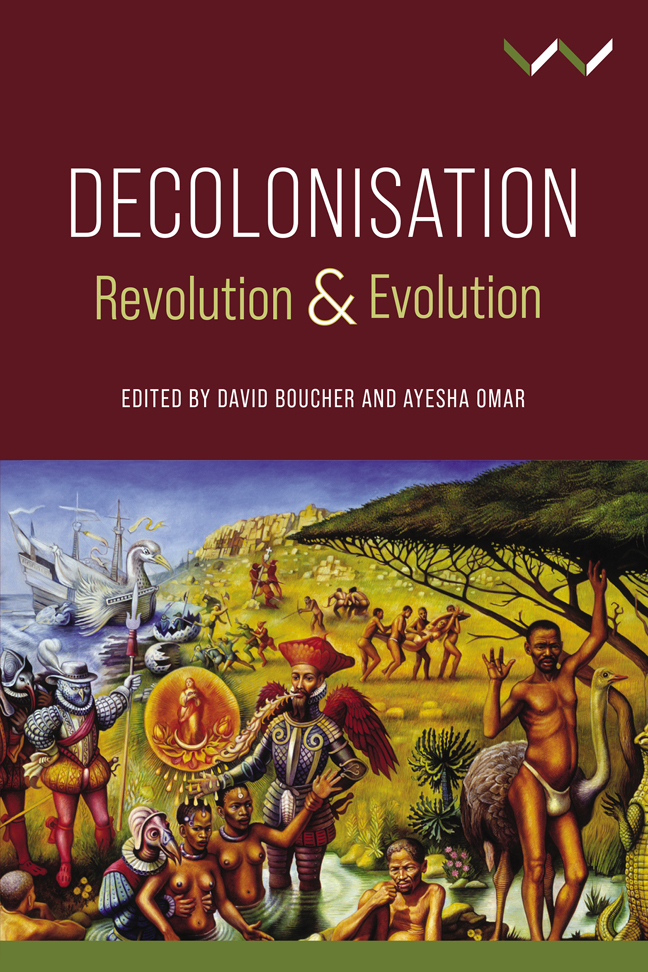Book contents
- Frontmatter
- Contents
- Acronyms
- Introduction: Decolonisation: Interdisciplinary Perspectives
- Chapter 1 The Invention of Blacks: Notes on Conquest, Fear and Time
- Chapter 2 The Decolonisation of Southern Africa: Historical Reflections
- Chapter 3 The Border of Trust at Kat River for Coloured Settlers, 1851–1853
- Chapter 4 Decolonisation and the Enduring Legacy of Colonial Borders in Africa
- Chapter 5 Fanon's Challenge: Identity, Recognition and Ideology
- Chapter 6 Beyond Redemption: Unsettling Progressive-Romantic Storyings of Colonial Injustice in Western Critical Thought
- Chapter 7 The Limits of Decolonisation and the Problem of Legitimacy
- Chapter 8 Decolonisation – Real and Imagined
- Chapter 9 Decolonisation and the Crisis of African Literature in the Twenty-First Century
- Chapter 10 Pedagogical Disobedience in an Era of Unfinished Decolonisation
- Contributors
- Index
Chapter 3 - The Border of Trust at Kat River for Coloured Settlers, 1851–1853
Published online by Cambridge University Press: 01 March 2024
- Frontmatter
- Contents
- Acronyms
- Introduction: Decolonisation: Interdisciplinary Perspectives
- Chapter 1 The Invention of Blacks: Notes on Conquest, Fear and Time
- Chapter 2 The Decolonisation of Southern Africa: Historical Reflections
- Chapter 3 The Border of Trust at Kat River for Coloured Settlers, 1851–1853
- Chapter 4 Decolonisation and the Enduring Legacy of Colonial Borders in Africa
- Chapter 5 Fanon's Challenge: Identity, Recognition and Ideology
- Chapter 6 Beyond Redemption: Unsettling Progressive-Romantic Storyings of Colonial Injustice in Western Critical Thought
- Chapter 7 The Limits of Decolonisation and the Problem of Legitimacy
- Chapter 8 Decolonisation – Real and Imagined
- Chapter 9 Decolonisation and the Crisis of African Literature in the Twenty-First Century
- Chapter 10 Pedagogical Disobedience in an Era of Unfinished Decolonisation
- Contributors
- Index
Summary
Decolonisation has proved a productive trope for critique over the past decade of the epistemic injustice of exclusionary Eurocentric hegemony in the Western academy, and for inclusion of alternative, heterogeneous and diverse voices. Whereas this rapid uptake of decolonial research gives the impression that the project began recently, we should remember that the struggle for decolonisation is practically coterminous with colonisation. The legacy of colonialism influences the struggle for decolonisation. In the drive to epistemic decolonisation, we must be careful not to dismiss the contributions of those who left this legacy behind, nor to repeat their errors. The tale presented in this chapter of colonial loyalty, of the coloured missionary settler, James Read Jr (1811–1894), and anti-imperial rebellion, of the coloured colonial settlers of the Kat River Settlement (KRS), reminds us of the complexity of the task. On the one hand, it teaches us to appreciate the value and attraction of colonial ideology for colonised subjects, and how colonial ideology influenced the struggle for decolonisation. On the other hand, we learn not to underestimate the willingness to abandon universalism, and the attraction of decolonisation for imperial powers. The metropole proved suspiciously receptive to decolonisation. Ignorance of such ideological complexity leads to anachronistic misunderstanding of decolonial agency in the history of colonialism. Ignorance of the imperial impetus towards decolonisation may also perpetuate epistemic injustices of colonialism, perversely, through our own efforts to decolonise.
The KRS was established by the British in 1829 as a frontier buffer zone of coloured settlers, between the Cape Colony and the isiXhosaspeaking territories. The Kat River settlers divided sharply over which side to join in the Eighth Frontier War (1850–1853). Only a minority joined the rebellion against the Colony. The local pastor, James Read Jr, who tells the tale we retrieve, was no brave nationalist hero but equally, he was no colonial dupe. Nevertheless, his loyalty to the British during the Kat River Rebellion puts him in a separate category from archetypical liberation leaders. He was a moderate Victorian colonial gentleman who advocated for British sovereignty in the eastern Cape Colony as a basis for Khoisan/coloured rights of citizenship. Had they all followed Read's advice, the Kat River settlers could have remained independent. Instead, greedy white neighbours used the uprising as an excuse to crush the settlement and seize its fertile land.
- Type
- Chapter
- Information
- DecolonisationRevolution and Evolution, pp. 75 - 102Publisher: Wits University PressPrint publication year: 2023



